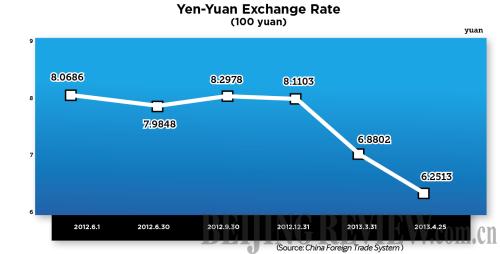|
The impact of a weak yen on the Chinese market should not be ignored. Japan, with a population of 127 million, holds $9 trillion worth of financial assets. In comparison, China, with a population of more than 1.3 billion, only holds $7 trillion worth of financial assets. The consumption capacity of the Japanese is 15 times that of the Chinese. Although China is the world's second largest economy, Japan, the world's third largest economy, has much more global economic sway than China. Since there are expectations that yuan will appreciate against yen and other major world currencies, China will become a major recipient of an inflow of yen. Therefore China faces serious pressure of imported inflation.
"Imported inflation brought by yen depreciation is uncontrollable and hard to regulate, which will make it more difficult for China to achieve the goal of stabilizing economic growth and controlling inflation," said Yi. He thinks it is politically responsible for China not to appreciate yuan.
China's reaction
Yi Gang, Deputy Governor of the Central Bank of China and Administrator of the State Administration of Foreign Exchange, said at the annual conference of the International Monetary Fund held in Washington in April that China is paying close attention to and is ready to react against yen depreciation.
Yi says China should consider easing monetary policies in some countries. On one hand, a monetary policy suitable to a country will expand the demand of the country and then invigorate the world economy, which will be conducive to a global economic recovery; on the other hand, if such an easing monetary policy causes competitive depreciation by other countries, no country will be a winner.
However, Yi didn't mention what measures China has prepared. The central bank didn't disclose any information either. A statement provided by the central bank says it hopes global competitive currency depreciation will not happen and countries will implement their respective policies in accordance with the agreement reached during the G20 summit.
Lu Zhengwei, chief economist of Industrial Bank Co. Ltd., thinks the Chinese Government should not adopt a passive attitude because South Korea has launched a $15.3-billion stimulus package to its exporters to overcome difficulty. China, he says, should follow suit.
"Yen depreciation has directly discouraged the Korean won from becoming strong, which brings pressure to China's industries. As a result, the high-end manufacturing industries, such as ship-making, iron and steel, automobile, photovoltaic and electronics, will all be dominated by Japanese and South Korean companies," Lu said. He even worries that if yen continues to depreciate, the likelihood that China would fall into the middle-income trap would increase.
Even though yuan hasn't depreciated like yen, China and South Korea should both engage Japan bilaterally and multilaterally, said Lu.
"The Chinese Government should first pay close attention to yen exchange rates. It at least should voice its own opinions, but not give free rein to Japan's behavior of shifting its troubles to others. China must also enhance its flexibility of yuan exchange rates."
Chang says China should appropriately ease its monetary policy and narrow the range of yuan appreciation, which will allow Chinese businesses to stay afloat.
Yi agrees with Chang. If yuan also depreciated, it would cause and worsen competitive currency depreciation around the world and ultimately lead to a loss for all parties involved. Considering that the Chinese economy is growing, internal inflation pressure still exists and bulk commodity prices in the international market are expected to rise, China may relax its monetary policy in a prudent and moderate way, thus stabilizing yuan exchange rates and alleviating damage to exports brought by a rapidly appreciating yuan.
Yi thinks in the future China should employ quantitative measures to counteract liquidity and avoid a rapid appreciation of yuan. But China must do more than that, he adds.
"China should carry out effective measures to stabilize yuan exchange rates and reduce market expectation of yuan appreciation," Yi said. "It should also severely stop the illegal cross-border trade of capital so as to prevent the sudden inflow of hot money and avoid big fluctuations in the property and financial markets."
Email us at: lanxinzhen@bjreview.com

| 